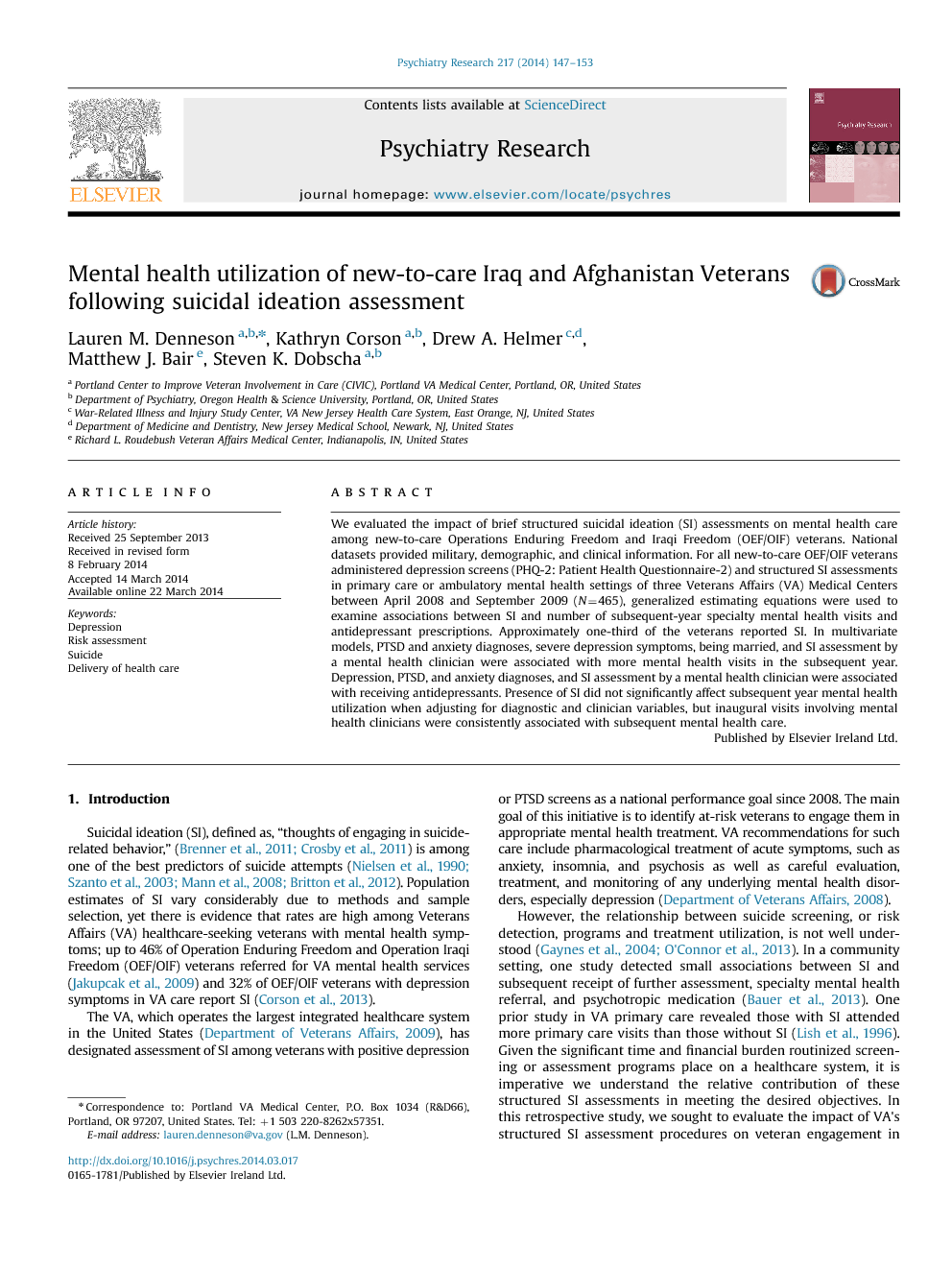We evaluated the impact of brief structured suicidal ideation (SI) assessments on mental health care among new-to-care Operations Enduring Freedom and Iraqi Freedom (OEF/OIF) veterans. National datasets provided military, demographic, and clinical information. For all new-to-care OEF/OIF veterans administered depression screens (PHQ-2: Patient Health Questionnaire-2) and structured SI assessments in primary care or ambulatory mental health settings of three Veterans Affairs (VA) Medical Centers between April 2008 and September 2009 (N=465), generalized estimating equations were used to examine associations between SI and number of subsequent-year specialty mental health visits and antidepressant prescriptions. Approximately one-third of the veterans reported SI. In multivariate models, PTSD and anxiety diagnoses, severe depression symptoms, being married, and SI assessment by a mental health clinician were associated with more mental health visits in the subsequent year. Depression, PTSD, and anxiety diagnoses, and SI assessment by a mental health clinician were associated with receiving antidepressants. Presence of SI did not significantly affect subsequent year mental health utilization when adjusting for diagnostic and clinician variables, but inaugural visits involving mental health clinicians were consistently associated with subsequent mental health care.
Suicidal ideation (SI), defined as, “thoughts of engaging in suicide-related behavior,” (Brenner et al., 2011 and Crosby et al., 2011) is among one of the best predictors of suicide attempts (Nielsen et al., 1990, Szanto et al., 2003, Mann et al., 2008 and Britton et al., 2012). Population estimates of SI vary considerably due to methods and sample selection, yet there is evidence that rates are high among Veterans Affairs (VA) healthcare-seeking veterans with mental health symptoms; up to 46% of Operation Enduring Freedom and Operation Iraqi Freedom (OEF/OIF) veterans referred for VA mental health services (Jakupcak et al., 2009) and 32% of OEF/OIF veterans with depression symptoms in VA care report SI (Corson et al., 2013).
The VA, which operates the largest integrated healthcare system in the United States (Department of Veterans Affairs, 2009), has designated assessment of SI among veterans with positive depression or PTSD screens as a national performance goal since 2008. The main goal of this initiative is to identify at-risk veterans to engage them in appropriate mental health treatment. VA recommendations for such care include pharmacological treatment of acute symptoms, such as anxiety, insomnia, and psychosis as well as careful evaluation, treatment, and monitoring of any underlying mental health disorders, especially depression (Department of Veterans Affairs, 2008).
However, the relationship between suicide screening, or risk detection, programs and treatment utilization, is not well understood (Gaynes et al., 2004 and O׳Connor et al., 2013). In a community setting, one study detected small associations between SI and subsequent receipt of further assessment, specialty mental health referral, and psychotropic medication (Bauer et al., 2013). One prior study in VA primary care revealed those with SI attended more primary care visits than those without SI (Lish et al., 1996). Given the significant time and financial burden routinized screening or assessment programs place on a healthcare system, it is imperative we understand the relative contribution of these structured SI assessments in meeting the desired objectives. In this retrospective study, we sought to evaluate the impact of VA׳s structured SI assessment procedures on veteran engagement in mental health treatment. Among new-to-care OEF/OIF veterans who screened positive for depression in VA outpatient settings, we identified the correlates of subsequent-year VA mental health care utilization, with particular interest in examining the relationship between SI and utilization. Based on recommended follow-up for SI, described above (Department of Veterans Affairs, 2008), we hypothesized that veterans with positive SI assessments would have an increased number of subsequent mental health specialty visits and/or psychiatric medication prescriptions, as compared to veterans with negative SI assessments.


